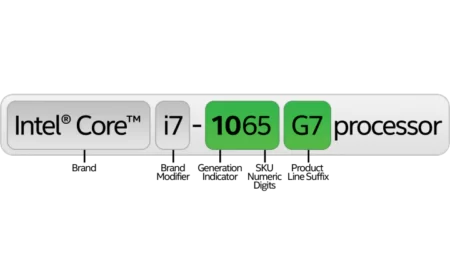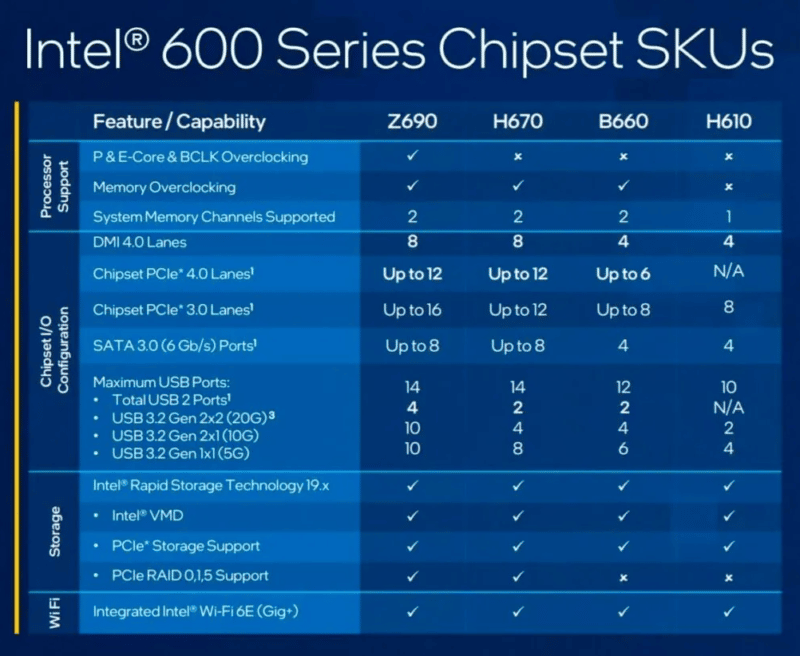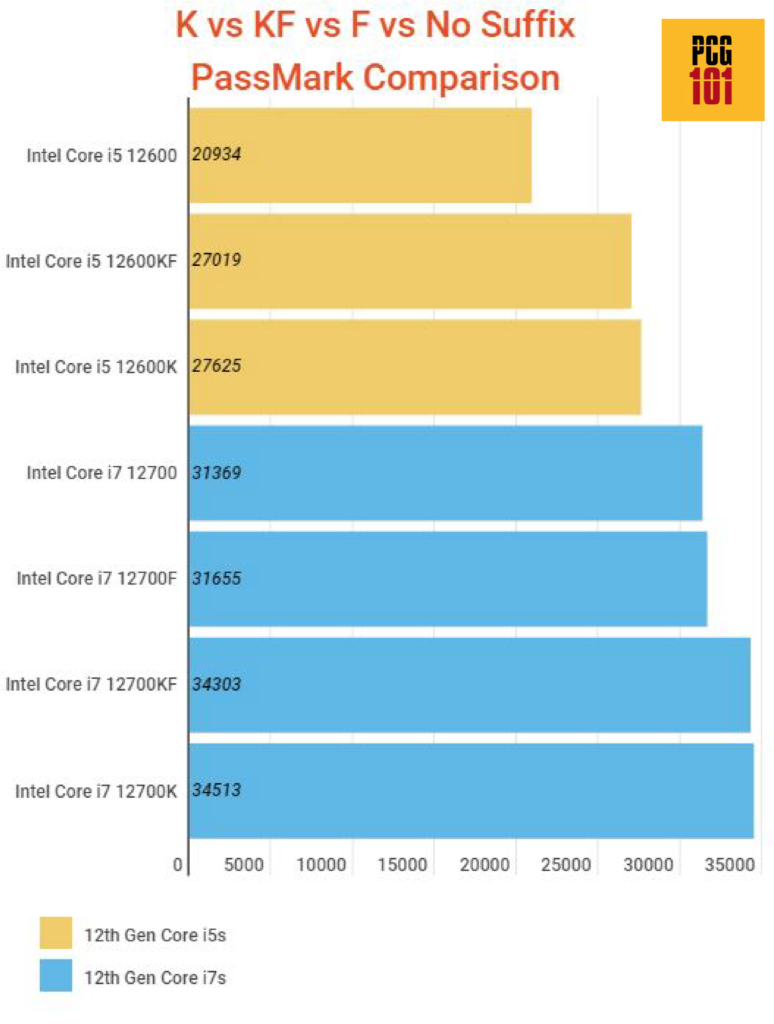If you read the model names of different Intel (or AMD) CPUs, you will notice that they include peculiar suffixes. While they may seem trivial, they hold tremendous significance. The letters in the suffix all have a different relationship to the processor’s specs.
While Intel has several suffixes, the most confusing to understand is the difference between Intel K vs. KF vs. F series processors.
The difference between the three primarily lies in whether a certain CPU is overclockable. A certain CPU has an integrated graphics card.
In addition, you can also tell by the suffix whether a certain CPU comes with a cooling solution, i.e., CPU Fan + Thermal Paste.
In the following article, I will talk in detail about the differences between the different suffixes in general and talk about K, KF, and F series CPUs in particular.
TABLE OF CONTENTS
Differences Between Intel K vs. KF vs. F Series Processors
The Intel naming convention can tell you a lot about the type of processor you have.

Image: The model name can tell you the CPU’s series, the generation, and the type.
For instance, the Intel Core i7 1065G7 above. Here we can see that it belongs to the Intel Core i7 series and the 10th Generation. The “G7” suffix tells us it is a mobile/laptop-based processor with a graphics processing level rated at 7 (rated from 1-7).
The suffix, in the end, is known as the “product line suffix,” It basically represents the nuanced differences a processor shares with the rest of its close counterparts.
So while Core i7-12700, 12700K, 12700KF, and 12700F may all have the same architecture, they are a whole lot different in some key specs, which we will now explore:
Intel K Series CPUs – Unlocked and Overclockable
The Intel K Series processors are also called “unlocked” processors. This basically means that they are overclockable.
These are the most powerful CPUs of any given Intel CPU lines (SKUs), and they are also the most expensive.
In other words, among the Core i7-12700, 12700K, 12700KF, and 12700F, the Intel Core i7 12700K would be the most powerful and expensive.
The following table lists the K series processors from the latest Gen Intel CPUs:
| Model | Specs | iGPU | MSRP |
| Intel Core i5 12600K | 6 P Cores 4 E Cores 16 Threads 4.9 GHz Max Clock | Intel UHD 770 | $289 |
| Intel Core i7 12700K | 8 P Cores 4 E Cores 20 Threads 5.0 GHz Max Clock | Intel UHD 770 | $409 |
| Intel Core i9 12900K | 8 P Cores 8 E Cores 24 Threads 5.2 GHz Max Clock | Intel UHD 770 | $589 |
The Intel K Series processors are intended for enthusiasts who wish to push the limits of the processing power of their processor by overclocking it.
A big caveat to overclock a “K” series CPU, you need to have the right motherboard!
Only the premium and often the most expensive “Z” series motherboard support is overclocking for Intel CPUs!
There for the 12th Gen “K” series CPUs, you must have a motherboard with a Z690 chipset. Similarly, for the 11th Gen “K” series CPUs, you need to have a motherboard with the Z590 chipset.

In addition to that, another two very important points to note are:
- The “K” series processors come with an integrated graphics card
In other words, you do not need a dedicated graphics card to connect your monitor to your PC. The integrated graphics card will power the video ports found on the back I/O panel of the motherboard.
- The “K” series processors DO NOT come with a cooling fan!
In other words, you must arrange the cooling solution for the “K” series processors yourself.
Also Read: Does My Motherboard Support Overclocking?
Intel F Series CPUs – No Integrated Graphics Card
Intel CPU SKUs with the F suffix do not have an integrated graphics card. This has great ramifications on your overall system build.
A CPU without an integrated graphics card is undoubtedly cheaper than the rest of its counterparts. However, it also means that the video output ports on your motherboard will NOT work.

For instance, the video ports on the motherboard above. Like all motherboards, these require an integrated graphics card on your CPU.
Motherboards DO NOT have onboard graphics processing chips of their own. Therefore, if you have an “F” series processor like the Intel Core i7 12700F, connecting your monitor to the motherboard HDM, DVI, and VGA port will result in no display.
In other words, you must have a dedicated graphics card for video processing.
“F” series CPUs are generally a good deal for gamers or those who wish to spend on a dedicated graphics card for their build. That way, they can save up a bit on the CPU as there is no need for a weaker iGPU if you already plan to have a powerful dedicated GPU.
| Model | Specs | iGPU | MSRP |
| Intel Core i5 12400F | 6 P Cores 12 Threads 4.4 GHz Max Clock | NA | $167 |
| Intel Core i7 12700F | 8 P Cores 4 E Cores 20 Threads 4.9 GHz Max Clock | NA | $314 |
| Intel Core i9 12900F | 8 P Cores 8 E Cores 24 Threads 5.1 GHz Max Clock | NA | $464 |
You can see that the Intel Core i7 12700F ($314 MSRP)) is $95 less expensive than the Intel Core i7 12700K ($409 MSRP)? But regarding the stock CPU performance, the “F” variant is only marginally slower than the “K” series CPUs, i.e., 34,513 points for i7-12700K vs. 31,655 points for i7 12700F, according to PassMark.
For instance, you can use the money saved to invest in a better-dedicated graphics card.
In addition to that, you do not need to go for the expensive Z series motherboards. You can go for the cheaper H series or the B series motherboards since “F” series processors are NOT overclockable.
Furthermore, unlike the “K” series processors, the “F” series processors DO have a stock CPU fan and thermal paste.
Also Read: Difference Between APU vs. GPU
Intel KF Series CPUs – Overclockable but No Integrated Graphics
Intel KF series processors combine the elements of the “K” and the “F” series processors.
The “K” here represents that the CPU is unlocked and overclockable. The “F” here means the CPU does NOT have an integrated graphics card.
This is often an excellent deal for enthusiasts and gamers. The “KF” CPUs are slightly cheaper than the “K” series counterparts as they do not feature an iGPU. The amount saved due to the absence of an iGPU can instead be used for buying a better dedicated GPU.
Hence, they are excellent for gamers and enthusiasts who plan to have a dedicated GPU for their build anyways and also wish to overclock their CPUs.
Of course, to overclock, like with the regular “K” series CPUs, you need to have a premium “Z” series motherboard such as the Z690 for 12th Gen CPUs.
The “KF” CPUs do NOT come with a stock cooler or thermal paste.
Here are some of the latest 12th Gen CPUs from the “KF” series.
| Model | Specs | iGPU | MSRP |
| Intel Core i5 12600KF | 6 P Cores 4 E Cores 16 Threads 4.9 GHz Max Clock | NA | $264 |
| Intel Core i7 12700KF | 8 P Cores 4 E Cores 20 Threads 5.0 GHz Max Clock | NA | $384 |
| Intel Core i9 12900KF | 8 P Cores 8 E Cores 24 Threads 5.2 GHz Max Clock | NA | $569 |
The price difference between a “K” and a “KF” CPU isn’t significant, i.e., the MSRP difference between Core i9 12900K and Core i9 12900KF is only $20. But it still allows you to play around with your PC build.
Again, since “KF” CPUs lack an iGPU, you must have a dedicated graphics card to connect your monitor to your PC; the video output ports on your motherboard will NOT work.
Also Read: Difference Between Intel Celeron vs. i7
Intel CPU with NO Suffix – Have iGPU but NOT Overclockable
The stock CPUs for any SKU is the model with no suffix, i.e., Intel Core i7 12700.
These are basically the vanilla CPUs that do feature an onboard integrated graphics card but are not overclockable.
They have a slightly lower clock speed performance than the “K” and the “KF” series CPUs but are also much cheaper.
The following table shows some of the 12th gen CPUs with no Suffix
| Model | Specs | iGPU | MSRP |
| Intel Core i5 12400 | 6 P Cores 12 Threads 4.4 GHz Max Clock | Intel UHD 730 | $192 |
| Intel Core i5 12600 | 6 P Cores 12 Threads 4.8 GHz Max Clock | Intel UHD 770 | $223 |
| Intel Core i7 12700 | 8 P Cores 4 E Cores 20 Threads 5.0 GHz Max Clock | Intel UHD 770 | $339 |
| Intel Core i9 12900 | 8 P Cores 8 E Cores 24 Threads 5.1 GHz Max Clock | Intel UHD 770 | $489 |
Intel K vs. KF vs. F Series CPU Summarized
The following table summarizes the key points for the Intel K vs. KF vs. F series CPUs.
| Overclockable | iGPU | Stock Cooler | Preferable Motherboard Chipset | Price | Performance | |
|---|---|---|---|---|---|---|
| No Suffix | No | Yes | Yes | Any | Less Expensive | Lower Performing |
| K | Yes | Yes | No | Z Series | Most Expensive | Highest Performing |
| F | No | No | Yes | Any | Least Expensive | Lower Performing |
| KF | Yes | No | No | Z Series | More Expensive | Higher Performing |
In terms of price point, the suffixes follow the following pattern:
- F – Least Expensive
- No Suffix – Less Expensive
- KF – More Expensive
- K – Most Expensive
Also Read: How is Processor Speed Measured?
More Suffixes and Their Meaning
There are more suffixes than just K, KF, and F for Intel processors. The following table summarizes these below:
| Platform | Suffix | Meaning |
|---|---|---|
| Desktop | No Suffix | Vanilla CPU of a given SKU |
| K | Unlocked/Overclockable High Performance |
|
| KF | Overclockable without iGPU | |
| F | No integrated graphics card | |
| S | Special Edition High Performing CPUs |
|
| T | Power efficient (Low TDP) | |
| X/XE | Unlocked, Top of the Line CPU intended of HEDT Not really general consumer grade Does not offer an iGPU or stock cooler |
|
| Laptop/Mobile | G1-G7 | Has iGPU The number describe the graphics power of iGPU ranging from 1-7 (7 being best) |
| H | High performance | |
| HK | High performance overclockable | |
| U | Low power/ power efficient | |
| Y | Very low power | |
| Embedded | E | For embedded system For enterprise or for prebuilt CPUs |
| Surface Mounting Type | B | CPUs with Ball Grid Array socket (often for embedded and laptop CPUs) |
Also Read: What is a Good Processor Speed for a Laptop?
Frequently Asked Questions
1. Intel K vs. KF vs. F – Which CPUs Have the Best Performance?
The following chart shows the Passmark scores of the Intel Core i7 and Core i5 CPUs from the 12th Gen.

- Scores are taken from cpubenchmark.net
Even from this small sample of CPUs, it is clear that the “K” series CPUs are the most powerful in a given SKU. However, the “KF” is only marginally less powerful. The performance difference is within the margin of error.
In other words, the K and KF are more or less the same in performance.
The F and the No-Suffix CPUs are weaker and have similar performance.
2. Do You Need a Dedicated Graphics Card with F and KF CPUs?
Yes, F and KF CPUs do not feature an integrated Graphics Card. Therefore, the motherboard video output ports will not work since they rely on the iGPU to function.
As such, you must have a dedicated Graphics Card to connect your monitor to or have any graphics rendering capability for your PC.
3. Is K Series CPU Worth It?
That depends on your budget and your use case. The “K” series CPUs are undoubtedly the most powerful of them all and also the most expensive. However, to truly justify your purchase, you have to take advantage of the fact that they are overclockable.
You can do without a “K” series processor if you do not want to overclock.
4. Is Intel K or KF Better for Gaming?
The “K” and “KF” CPUs are the same regarding performance. The only difference is that the “KF” series CPUs lack an integrated graphics card.
Integrated graphics cards aren’t really intended for gaming anyways. Therefore, having them or not having them does not really impact a gamer’s experience since a true gaming PC will most certainly have some form of dedicated graphics card anyway.
5. Can You Use Any Motherboard to Overclock K and KF CPUs?
No, you need a premium Z series motherboard to overclock the K and KF series CPUs.
Hence,
- For the 12th K and KF series CPU, you need a Z690 motherboard to overclock
- For the 11th K and KF series CPU, you need a Z590 motherboard to overclock
So on and so forth.
You can also use K and KF CPUs on B and H series motherboards, but you will NOT be able to overclock them.
6. Do K and KF Series CPUs Come with a CPU Cooler?
No, K and KF series CPUs have no thermal solution. They neither come with a CPU cooler nor with a thermal paste.
Since they are intended for overclocking, you need an after-market high-performance cooling solution, preferably liquid cooling, to overclock these CPUs effectively.
